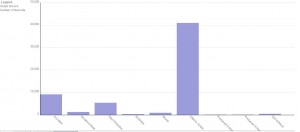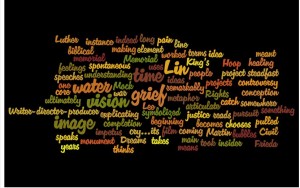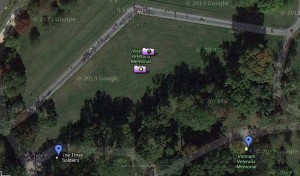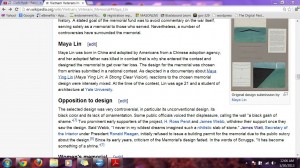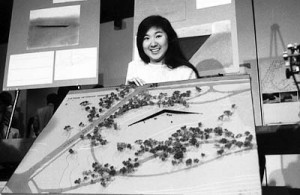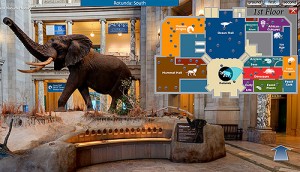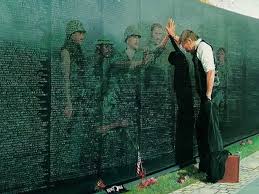Archive for Uncategorized
Final Project-text!
There is more text on the actual website, which can be viewed here . I would use firefox to view the website since the maps do not seem to work on Chrome.
Chart and Graphs
The line graph compares the number of times the name Maya Lin and Vietnam Veterans Memorial was mentioned between the years of 1970-2008. The spike could be attributed to a number of factors, but through some research I have come to the conclusion that has to do with the fact that a the Three Servicemen statue was added, the flag, the Nurses Statue, book release, along with a documentary were all released during this time period.
I wanted to get a better look at the number of casualties the war in Vietnam saw. It help put into perspective the number of names the wall holds.
June 18th blog.
Takes a minute to realize it, but I think the wordle encompasses pretty accurately what the article Maya Lin: Clear Strong Visionary discussed. In the wordle the words grief, vision, Lin, water, and image can be seen and it is interesting how it abstractly summarizes what the article was about by taking important words into consideration.
Better late than never…
A rough look at my Vietnam Memorial map. I’m working on adding pins of the names of the casualties on the wall.
Prying Eyes
It’s easy to be paranoid on the web, with hackers on the loose, identity thief’s watching your every move, and more recently catfishing. When I evaluate my own practices on the internet and compare them to the articles that were assigned, I come to the conclusion that I need to be more proactive in my pursuit of protecting myself from these “invisible” assailants.
In order to protect identity and sensitive information I have created passwords that I deem to be highly secure. I combine different languages and numbers in order to formulate a password though according to the article Why passwords have never been weaker—and crackers have never been stronger programs are making it easier for hackers to crack passwords with the use of programs that combine different words, numbers, and symbols.
I have an antivirus program installed in my computer that alerts me of any fraudulent activity. I have also created to user accounts on my computer, an administrative account and a guest user account–both secured by a password. Although I see myself as a person who is fairly secure on the internet, I do think I should be more vigilant about backing up important files.
Websites like Instagram and Facebook which seem innocent can be a heaven to hackers, since we post so much of our personal lives on there. So, we may think we are safe on the internet but the reality is that we are more vulnerable now than before. It is a time to view our practices online and decide what we are going to change.
Faking My Way to the Top.
Can you spot the fake?
“Sometimes, the Internet can feel like a middle-school playground populated by brats in ski masks who name-call and taunt with the fake bravery of the anonymous. But sometimes – thank goodness – it’s nicer than real life.”~Susan Orlean
Today I was that brat in the ski mask. Wiki can be a helpful tool to start off a research project, as it quickly provides easy and accessible information to all, but it is important to keep in mind that this can be dangerous. To the untrained eye my post on the site may seem to be legitimate since Maya Lin is of Asian descent, but a the reality is that she was born in the United States. I think the most important thing one can take away from this exercise is to view sources with a critical and discerning eyes.
And the Research Begins…
In Maya Lin: A Strong Clear Vision, the author Chizu Omori from the Northwest Asian Weekly newspaper based in Seattle, Washington discusses the documentary based on Maya Lin and her life and career as an architect. Though the article is brief it discusses some interesting topics. Omori praises Lin for being a strong Asian American woman with “a spine of steel”, which may be eluding to the fact that the young Lin faced many who opposed her design, but also leads one to believe that the Asian American community was proud of her accomplishments.
Although I found it interesting that the article praises her for breaking down preconceived notions of Asian American women, I focused more Maya Lin’s intention for the Vietnam Memorial. She discusses that her goal was for people to cry, in other words, the design of the memorial was to cleanse the soul of the grief and pain that accompany’s war. Though this does not answer my research question, it provides me with the first paint strokes on the picture I am trying to paint of what her intentions were with the design.
After reading the article I was intrigued by the documentary. And I searched for it on YouTube. There I found a short (poorly edited) YouTube video that showcases some parts of the documentary A Strong Clear Vision, which can be viewed by following this link http://www.youtube.com/watch?v=YjhOvutbXw. Now my next step in my research is to search for the reaction of Vietnam Veterans and why they found the memorial so offensive or not. Now I’m asking myself why they didn’t see Maya Lin’s purpose what made them view it as negative or positive.
Internet + Museums= Revolution of Knowledge?
Internet exhibits transcends the barrier of time
- The internet has created a new way for people to experience museums and public history. The example of the portrait purchased by the Smithsonian of George Washington is a prime example of how museums are expanding their audiences. A person who might have not had the luxury of traveling to a location to view the famous painting of Washington now has the opportunity of experiencing the full exhibition online to little or no cost to him/her. Not only are the visitors reaping the benefits of having exhibitions online, but museums curators are also enjoying the benefits the internet can provide.
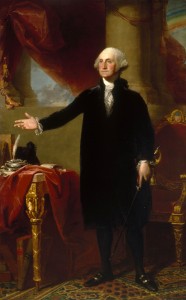 Here are some examples:
Here are some examples:
- Helps museums with space limitations.
- Promotes conversation within the internet community
- May expand museum’s popularity
Revolutionizing Museums
- What is the next step in the REVOLUTION of museums? Will virtual museums replace real museums? Which setting is more educational?
I personally think that museums are gearing towards a more virtual aspect. This is because virtual exhibitions/museums are much more accessible and help the visitor find more information about a subject or exhibition much easier through hypertext links and online archives that may not be available to a person if they were to physically visit a site. Though virtual museums are becoming more popular I do not see them replacing real museums anytime soon. Being physically at a site and experiencing the ambiance of a place cannot be achieved through the virtual experience. Moreover, I see a collaboration between the two, symbiotically helping each other to achieve a better experience for the visitor.
- But in the end this is just my opinion, I would like you guys to visit the Smithsonian panoramic virtual tour http://www.mnh.si.edu/panoramas/ and tell me what your thoughts. Do you feel like the experience was sufficient or would you have liked to visit the museum?
*this blog was made as a response to Exhibits, Films, Scholarship, and Essays section in the Digital Past*
Preliminary Questioning Final Project:
Why was there so much protest surrounding the design the Vietnam Memorial made by Maya Lin?
Historical Site
The area I am interested in researching for my final project is the Vietnam Memorial.
Three historical topics of interest are as follows:
- The actual design of the memorial. The design was submitted by Maya Lin a Yale student at the time and I am interested to know what made her design so controversial. ~Why did she say that her racial background had something to do with the committee picking her design. INTERESTING: The design by Maya Lin is not commemorating the war instead when visiting the memorial one gets a somber feeling.(things I want to find out) Was this the original goal of the design? How did the public react to this? Was it on purpose that an Asian American was the winner?
- The lack of political support. Why didn’t Pres. Reagan show up to the dedication ceremony? INTERESTING: It is known that the Vietnam War was a war that faced much opposition from the public, but why was the government so opposed to supporting it? Why didn’t Reagan show up to the dedication ceremony? What were some of the implications to arise from this controversial move?
- The women’s memorial- that is with in the Vietnam Memorial~why was the original design so controversial? (Vietnamese baby). INTERESTING: A women’s memorial was later added. I want to know why it was added? I also want to find out why was the first design rejected?
Is Traditional Pedagogy Gone or is it Merely Evolving?
Since the dawn of time, traditional pedagogy has been a teacher centered phenomenon. The teacher an active character in the discussion and the student as a passive entity. Though this has been the standard for many years a little thing called the internet has been changing this traditional setup, and quite frankly it is about time!! Anyone who has been in a classroom that revolves around a lecture can tell you that it is BORING!!! And many times very ineffective.
Technology is evolving the traditional pedagogy and replacing it with a much more interactive environment for students. As mentioned in the introduction of The Digital Past by Cohen and Rosenzweig the internet has expanded the knowledge of many, and in my opinion it gives teachers an open window for exploration with their students. Not only can history teachers explore museum archives they can share it with their students and create fun and engaging projects.Although the internet can be an especially helpful tool there are still many who oppose digital history as a new learning tool. They claim that because it is not lead by scholarly experts that it is ineffective. Though I am a supporter of using sources on the internet to teach and do research, I do not wholeheartedly disagree with the “techno-skeptics” mentioned by Cohen and Rosenzweig. Instead of being on one radical side of the spectrum, I believe a “happy medium” can be achieved. And this is when a good teacher comes in and advises their students. High school and college students alike should be advised about the potential fraudulent sources that can be available on the internet. Moreover, I think students throughout the years have become more aware of what sources are “scholarly”. Though I do not think physical archives and books will be completely vanished, I do believe that the trend in teaching and learning history has become more internet based.
*In all after our discussion about digital history as a learning forum, I was left with an urge to learn more about where and how teachers are evolving with technology and how they are using it to engage students. I’m particularly interested in this because I am working on becoming a High school history teacher and I want to know how this new tradition will impact the way we teach in the classroom.

